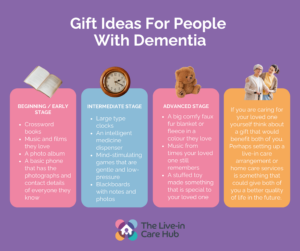Dementia (also known as major neurocognitive disorder) is not a disease in itself but can be due to many reasons where the parts of the brain responsible for memories, decision-making, learning and language are affected by damage or disease. The majority of cases are caused by Alzheimer’s and the risk increases with age. By their 80s over half of the elderly are affected. Planning for your care can be invaluable in the early stages of dementia to reduce stress on yourself and your loved ones.
Dementia; as with many conditions varies in its degree of severity as it’s used as an umbrella term to describe a loss of memory, attention and the ability to think logically and clearly. It can present as mild cognitive impairment in some but leave others incapable of caring for themselves which can be distressing not only for the person living with it, but of great concern to their family.
Stage 1
This is called no impairment because although tests may reveal a problem – the person is not experiencing any symptoms.
Stage 2
Very mild decline – here there could be slight changes in behaviour but a loved one may still be very independent.
Stage 3
Mild decline – a loved one may repeat themselves a lot, have difficulty making plans or forget recent events.
Stage 4
Moderate decline is often signified by an intensification of the symptoms above. This could be coupled by difficulties handling money and travelling unaccompanied.
Stage 5
Moderately severe decline will see a loved one forgetting things like their grandchildren’s names or their own phone number. They may also forget what day or time it is with those affected often getting up in the middle of the night or wandering away from home. This could put them in danger.
Stage 6
Severe decline is the stage that can be the most upsetting for loved ones when their elderly relative forgets their name or fails to even recognise them. They can need help eating, drinking and using the toilet and may also suffer personality changes. For examples, they may become aggressive when they had been of a mild personality before.
Stage 7
Very severe decline sees the elderly person unable to walk or vocalise their thoughts; spending most of their time in bed and needing around the clock care.
Understanding Dementia
How Does Dementia Affect People?
Symptoms, treatments and practical coping strategies
Dementia can be a devastating experience not only for the person affected but also their loved ones who can find themselves having to adapt to losing (in the more severe cases) the version of the person they once knew. Using live-in care services where a person is still well enough, however, can be a very positive decision helping other family members regain peace of mind with their loved one able to stay in their own home with the proper care. There is great comfort in the familiar and with help and support – people living with dementia can retain their independence for as long as possible.






